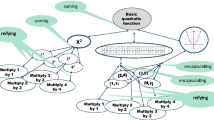Abstract
Sfard and Kieran [Kieran, C., Educational Studies in Mathematics 46, 2001, 187–228; Sfard, A., Educational Studies in Mathematics 46, 2001, 13–57; Sfard, A. and Kieran, C., Mind, Culture, and Activity 8, 2001, 42–76] have developed a methodological framework, which aims at characterizing the students’ mathematical discourses while they are working in groups. In this study, I focus on an important aspect of this methodological framework, namely the interactive flowcharts. The aim of this study is to suggest two complementary analyses for the construction of the interactive flowcharts: an additional analysis by means of the analytical construct of contextualization as well as an analysis of types of mathematical discourses. Based on data from a study of how four groups of Swedish engineering students collaboratively construct concept maps in linear algebra. I show that the two complementary analyses make the construction of the interactive flowcharts more coherent and transparent, and hence, more reliable. Furthermore, the two complementary analyses dramatically changed the picture as to whether the studied discourses were to be seen as mathematically productive or not. In the end of the article, I discuss the possibilities of performing the suggested additional analyses within the original methodological framework.
Similar content being viewed by others
References
Bartolini Bussi, M.G.: 1998, ‘Verbal interaction in the mathematics classroom: A Vygotskian analysis’, in H. Steinbring, M.G. Bartolini Bussi and A. Sierpinska (eds.), Language and Communication in the Mathematics Classroom, National Council of Teachers of Mathematics (NCTM), Reston, VA, pp. 65–84.
Boaler, J.: 2002, Exploring the nature of mathematical activity: Using theory, practise and ‘mathematical hypotheses’ to broaden conceptions of mathematics knowing, Educational Studies in Mathematics 51, 3–21.
Cobb, P.: 1994, ‘Where is the mind? Constructivist and sociocultural perspectives on mathematical development’, Educational Researcher 23, 3–20.
Cobb, P., Stephan, M., McClain, K. and Gravemeijer, K.: 2001, ‘Participating in classroom mathematical practices’, The Journal of the Learning Sciences 10, 113–163.
Even, R. and Schwarz, B.B.: 2003, ‘Implications of competing interpretations of practice for research and theory in mathematics education’, Educational Studies in Mathematics 54, 283–313.
Goos, M., Galbraith, P. and Renshaw, P.: 2002, ‘Socially mediated metacognition: Creating collaborative zones of proximal development in small group problem solving’, Educational Studies in Mathematics 49, 193–223.
Halldén, O.: 1982, Elevers tolkning av skoluppgiften The Learners' Interpretation of the School Task, PhD Thesis, Department of Education, Stockholm University,Sweden.
Halldén, O.: 1988, ‘Alternative frameworks and the concept of task. Cognitive constraints in pupil's interpretations of teachers' assignments’, Scandinavian Journal of Educational Research 32, 123–140.
Halldén, O.: 1999, ‘Conceptual change and contextualisation’, in W. Schnotz, S. Vosniadou and M. Carretero (eds.), New Perspectives on Conceptual Change, Pergamon Press, London, pp. 53–65.
Kieran, C.: 2001, ‘The mathematical discourse of 13-year-old partnered problem solving and its relation to the mathematics that emerges’, Educational Studies in Mathematics 46, 187–228.
Kieran, C., Forman, E., and Sfard, A.: 2001, ‘Guest editorial learning discourse: Sociocultural approaches to research in mathematics education’, Educational Studies in Mathematics 46, 1–12.
Lerman, S.: 2000, ‘The social turn in mathematics education research’, in J. Boaler (ed.), Multiple Perspectives on Mathematics Teaching and Learning, Ablex Publishing, London, pp. 19–44.
Linell, P.: 1998, Approaching Dialogue: Talk and Interaction in Dialogical Perspectives, John Benjamins Publishing, Philadelphia, USA; Amsterdam; The Netherlands.
Lithner, J.: 2003, ‘Students' mathematical reasoning in university textbook exercises’, Educational Studies in Mathematics 52, 29–55.
Moschokovich, N.J.: 2004, ‘Appropriating mathematical practices: A case study of learning to use and explore functions through interaction with a tutor’, Educational Studies in Mathematics 55, 49–80.
Novak, J.D. and Gowin, D.B.: 1984, Learning How to Learn, Cambridge University Press, Cambridge, UK.
Radford, L.: 2003, ‘On the epistemological limits of language: Mathematical knowledge and social practice during renaissance’, Educational Studies in Mathematics 52, 123–150.
Ryve, A.: 2004, ‘Can collaborative concept mapping create mathematically productive discourses?’, Educational Studies in Mathematics 56, 157–177.
Scheja, M.: 2002, Contextualising Studies in Higer Education, PhD Thesis, Department of Education, Stockholm University, Sweden.
Schoenfeld, A.H.: 1992, ‘Learning to think mathematically: Problem solving, metacognition, and sense making in mathematics’, in D.A. Grouws (ed.), Handbook of Research on Mathematics Teaching and Learning, MacMillan, New York, pp. 334–370.
Schoenfeld, A.H.: 1999, ‘Looking toward the 21st century: Challenges of educational theory and practice’, Educational Researcher 28, 4–14.
Sfard, A.: 2000, ‘On reform movement and the limits of mathematical discourse’, Mathematical Thinking and Learning 2, 157–189.
Sfard, A.: 2001, ‘There is more to the discourse than meets the ears: Looking at thinking as communication to learn more about mathematical learning’, Educational Studies in Mathematics 46, 13–57.
Sfard, A.: 2002, ‘The interplay of intimations and implementations: Generating new discourse with new symbolic tools’, The Journal of the Learning Sciences 11, 319–357.
Sfard, A. and Kieran, C.: 2001, ‘Cognition as communication, rethinking learning-by-talking through multi-faceted analysis of students' mathematical interactions’, Mind, Culture, and Activity 8, 42–76.
Simon, A.J.G.: 2004, ‘Raising issues of quality in mathematics education research’, Journal for Research in Mathematics Education 35, 157–163.
von Wright, G.H.: 1971, Explanation and Understanding, Cornell University Press, Ithaca, New York.
Wistedt, I.: 1987, Rum för Lärande Latitude for learning, PhD Thesis, Department of Education, Stockholm University, Sweden.
Wistedt, I. and Brattström, G.: 2004, ‘Understanding mathematical induction in a co-operative setting: Merits and limitations of classroom communication among peers’, in A. Chronaki and I.M. Christiansen (eds.), Challenging Perspectives on Mathematics Classroom Communication, Information Age Publish, Greenwich, Conn., US.
Author information
Authors and Affiliations
Corresponding author
Rights and permissions
About this article
Cite this article
Ryve, A. Making Explicit the Analysis of Students’ Mathematical Discourses – Revisiting a Newly Developed Methodological Framework. Educ Stud Math 62, 191–209 (2006). https://doi.org/10.1007/s10649-006-4834-0
Issue Date:
DOI: https://doi.org/10.1007/s10649-006-4834-0




